Epidemics can take many forms. Sometimes, they can be quite serious, like when all of your friends suddenly start posting their 2048 scores on Facebook, or transforming themselves into Bitstrips. You have to step back and wait for the symptoms to die down before you can expect the usual updates about food and the antics of children.
There are, of course, real outbreaks that have changed the course of history. The Black Death backpacked across Europe for about 200 years, killing 30–60% of Europe’s population, and reducing the world population from an estimated 450 million down to 350–375 million. Smallpox ravaged America after Europeans ran amok across the continents, killing entire tribes in New England and decimating the Aztec civilization. Cholera, Influenza, Typhus, polio, AIDs, swine flu, bird flu, SARS, Ebola, dengue fever—the list goes ever on.
As with all terrifying things, humans have taken these experiences and turned them into stories, trying to make sense of illness, and figure out what our reactions to plague say about us as a species. The real diseases have informed plenty of fiction throughout the centuries, inspiring classic works like The Decameron and, well, less classic works like Outbreak. While it’s hard to talk about favorite diseases, I’ve tried to pick out some of the greatest fictional outbreaks, fake diseases that provide a unique way to comment on society and human nature.

Haden’s Syndrome, AKA Not Bird Flu
Lock In—John Scalzi
John Scalzi plays with the trope of not-famous-disease directly in his novella “Unlocked.” In a series of interviews with doctors, journalists, and epidemiologists, we learn that Haden’s syndrome—a condition which causes a person’s consciousness to be “locked in” to their body—was disastrously misdiagnosed as H5N1 bird flu.
The novel Lock In, set 25 years later, presents a society that has been completely transformed by the epidemic. People with the disease—called “Hadens”—are given three options for interaction with non-Hadens: the government-funded Agora, a virtual reality where Hadens can interact free of corporeal restriction; Integrators, people who can perform a sort of mind-meld with a Haden to help them to experience physical life directly (apparently eating bacon cheeseburgers are a big component of the life of an Integrator); and “threeps” (as in C3Pos), which are specially-designed robots that allow Hadens to move freely while their bodies lie in cradles at home. An argument rages over whether Hadens still deserve special privileges due to their illnesses. Why should the government keep footing the bill for the Agora, when private business could move in and plaster it with ads? Why shouldn’t threeps be the same sort of status symbols that cars are? Scalzi places a murder mystery squarely in the front of the book, then allows his satire of society to come into focus slowly, until you’re not even sure what kind of book you’re reading. He gives us a look at a culture that has just about worn out its empathy for illness.
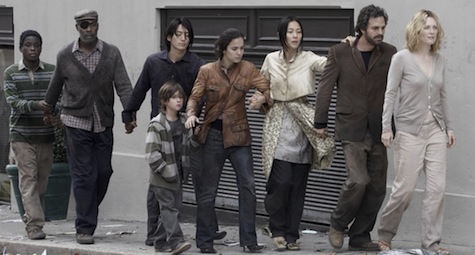
Blindness
Day of the Triffids—John Wyndham
Blindness—José Saramago
In Triffids, it is a combination of the Triffids themselves vicious sentient plants (possibly engineered by evil Russkies) that can walk on their roots and spray poison, and a mysterious meteor shower (also, possibly, evil-Russkie-related) that blinds all who watch it. The small clusters of people who keep their sight band together to try to survive, while acting as metaphors for the human condition. Things go south pretty fast, as sighted people either take advantage of the blind, or try to exclude them from new polyamorous enclaves. Then the government shows up to be despotic at everyone, and our (sighted, but still morally OK) protagonists have to make choices about what kind of society they’re willing to live in.
Nobel Prize winning author Jose Saragamo used some of the same metaphors in Blindness, but dispensed with the foolish idea that humanity might have even a shred of decency. Here the titular blindness descends on the population with no warning or apparent cause. Those afflicted are trapped in an asylum, where a cult quickly takes control, hoarding food, threatening the other inmates, and (obviously) sexually enslaving all the women. Our (secretly sighted) protagonist has to make tough choices about what kind of society she’s willing to live in.

Captain Trips
The Stand—Stephen King
Really, Stephen King? Captain Trips. That’s what you’re giving us here. OK, so the disease/Grateful Dead cover band wipes out most of the population, and then the survivors, who don’t understand why they’ve survived (but do understand that they each perfectly represent a different segment of our human family) choose their alignments and set out for either Mother Abigail’s Christian-ish utopia, or Randall Flagg’s most-likely literally Satanic group, which, for maximum subtlety, has decided to live in Vegas. Some women are sexually enslaved. Everyone has to make tough choices about what kind of society they want to live in.
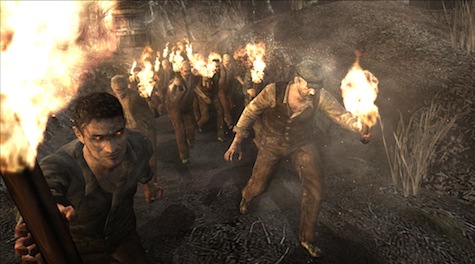
T-Virus/ Las Plagas/Conversationalism/Vampiris/ Krippin Virus (KV)
Resident Evil series—Capcom
Pontypool—Bruce McDonald
I Am Legend—Richard Matheson
The Omega Man / I Am Legend—Boris Sagal/ Francis Lawrence
The virus has taken the town/nation/world. Only a few uninfected humans remain, and they act as our conduit into a world that is our own, yet not our own. They live in constant fear of being attacked or—maybe worse—infected themselves. The mood of general doom is periodically punctuated by zombies or rage monsters bursting through doors or shattering glass. Sometimes, another normal human is encountered, but usually this encounter does not end well. Sometimes there is a dog. This usually doesn’t end well, either. Society is long dead, reader, and your protagonist is not at all sure it should be revived. After all, it might come back…changed.

Rage (Human Cortico-Deficiency Virus)/The Real Monster is Us
28 Days Later—Danny Boyle
28 Days Later follows a similar track, but with rage monsters instead of zombies! The film does a brilliant twist of treating the zombie outbreak as only the beginning of the problem. The real horror comes when our protagonists, Jim, Selena, and Hannah, have to face ordinary humans, and realize too late that fear and desperation have turned them into the real monsters. (If you were betting on sexual enslavement playing a role here, well, you’ve hit the jackpot!) Seriously, though, if society’s this fucked up, why live in it at all?

I-Pollen/ Synaptic Seepage/Nerve Attenuation Syndrome/Snow Crash
Transmetropolitan—Warren Ellis, Darick Robertson
Burning Chrome/Johnny Mnemonic—William Gibson/Robert Longo
Snow Crash—Neal Stephenson
Once we’ve poisoned the airwaves with too much information, it goes out of control, almost like some sort of Pandora’s Box scenario. In Transmetropolitan, I-Pollen is a degenerative disease that slowly destroys the memory and motor skills of the patient, an obvious analogue to Alzheimer’s or Parkinson’s disease, but with the 90’s technophobic twist that you get it from being exposed to “Information Pollen.”
In Johnny Mnemonic, information couriers can fall victim to N.A.S. (otherwise known as “the black shakes”) and the only cure seems to be…watching a code unspool on TV? Or talking to a telepathic dolphin? We’re still not sure.
Snow Crash is a drug/virus that can be either transmitted via computer virus in the Metaverse, or a brain fever disseminated through Pentecostal preaching in meatspace. Either way, you’ve got glossolalia and motor control collapse. Society is too info-addled to be worth saving, man.
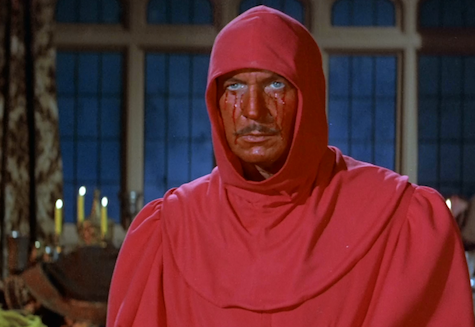
The Red Death/The Black Death
Masque of the Red Death—Edgar Allan Poe
The Seventh Seal—Ingmar Bergman
Summering in the country sounds great to us now, but a lot of richer folk in the Middle Ages did it to avoid plague outbreaks in the city. Boccaccio even comments on this in his classic work, The Decameron, setting his wraparound story in a country estate that acts as a refuge for a group of young people.
Slightly more recently, Edgar Allan Poe decided the Black Death just wasn’t gruesome enough, and gave us the “Red Death,” so named because blood literally pours from your pores. In his story (and the Vincent Prince-starring Corman adaptation) a Satanic nobleman hosts a masque ball as a mockery of the disease, while claiming to provide his guests refuge.
And in Bergman’s Seventh Seal, the Black Death becomes one of the characters. Death is personified stalking the land and claiming victim after victim. A knight returning from the Crusades confronts a society that has been torn apart by fear: some leave their communities to become wandering flagellants, while others reject God and religion entirely to embrace a nihilistic philosophy. The Knight finally returns home to his loving, faithful wife—but has he escaped Death?

Teen Plague
Black Hole—Charles Burns
Teens call this STD “the bug” and it’s just like a regular STD except that instead of appearing as a rash or some sort of gross excretion, it causes mutations, like extra limbs, to sprout on random spots on the body. It seems to only afflict the teenagers in the area, and might be at least a little metaphorical. Like good teenagers, they all shun anyone affected, and like a good metaphor for life, the shunners tend to get a plague-based comeuppance.
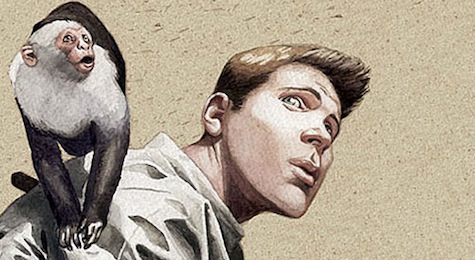
Gender-Specific Mystery Illness
The White Plague—Frank Herbert
Y: The Last Man—Brian K. Vaughn, Pia Guerra
These two wear their concerns with sexuality and fertility on their sleeves. In Herbert’s novel, a molecular biologist unleashes a plague upon the women of the world in retaliation for the death of his wife and children, who died in an IRA bombing. In Brian K. Vaughan’s Y: The Last Man, Yorick Brown wakes up to discover that he is the last human male left. In both stories, the entire world free falls into chaos as people are abruptly confronted with extinction.

Pregnancy
Like the grains of sand in the desert…
I kid, I kid. But there is a lot of great pregnancy-based body horror out there. Alien, Prometheus, Carnosaur – why, it’s almost as though male writers and filmmakers are made uncomfortable by certain elements of the female body.
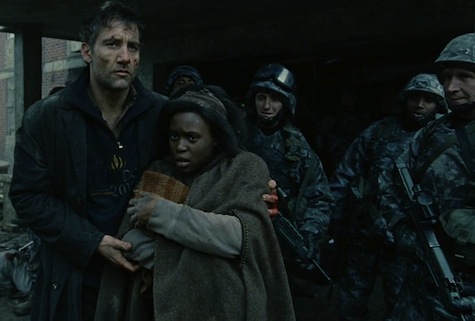
Lack of Pregnancy
Children of Men—Alfonso Cuarón
No one seems to know what caused the mass infertility and 100% child mortality in Children of Men. No one knows how to reverse it. Looking down the barrel of extinction, the human race mostly collapses into terrorism and warfare. The protagonist, Theo, has accepted humanity’s fate, until he’s charged with helping the first pregnant woman the world has seen in 20 years. Society might be worth saving? But it needs to work for it.
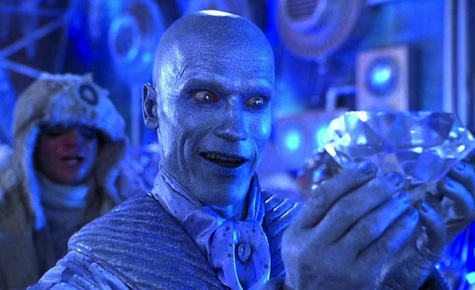
MacGregor’s Syndrome
Batman & Robin—Satan Himself Joel Schumacher
MacGregor’s seems to be a Glamorous Hollywood Wasting Illness straight out of the 1940s, which makes its abrupt outbreak in the mid-1990s film Batman & Robin all the more inexplicable. Probably Joel Shumacher tampered in God’s domain, or something. Mr. Freeze’s wife, Nora Freeze, was in a late stage of the disease when Freeze froze her, hopefully forgoing once of his ice-based puns. He managed to develop an antidote that will reverse the illness, but only up to stage-1—which, it just so happens, Alfred Pennyworth has. Dun dun DUNNNNN. Will Freeze’s cold heart thaw enough to save Batman’s loyal butler? This film has no connection to society, humanity, common sense, or basic reasoning skills.
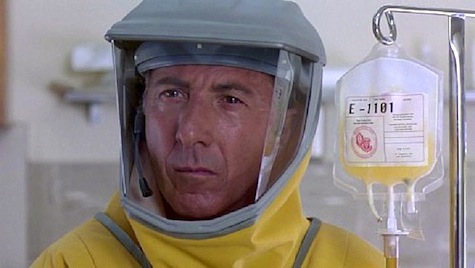
Motaba
Outbreak—Wolfgang Petersen
Motaba is a horrifying fictional disease (which is totally not Ebola!) that kills extras and plot-significant supporting actors indiscriminately, but slows its incubation period once the female lead is infected. Luckily for the female lead, who is also the estranged-but-still-interested wife of the male lead, the government has an antidote! But since they want to use Motaba as a chemical weapon they’re being a little stingy with it. Will the feds bomb California to cover up the disease? Will Rene Russo and Dustin Hoffman reconcile? And most importantly: DOES THE MONKEY LIVE??

Space Dementia/Space Madness/Space Rabies
Armageddon—Michael Bay
Ren & Stimpy—John K.
Howard the Duck—Willard Huyck
Space Dementia afflicts Rockhound when he attempts to help The Greatest Deep-Core Driller in Human History, Harry Stampers, with his Deep Core Drilling, which isn’t a metaphor for anything. Rockhound’s main symptoms appear to be witty banter and questionable relationships with loan sharks.
Ren Hoek and Stimpson J. Cat’s Space Madness seems to be a more serious strain of the same disease, with Ren hallucinating more than usual, and Stimpy determined to push the jolly, candy-like button that will spell their doom.
Space Rabies is made up by Howard the Duck to scare a would-be attacker; unlike the rest of the diseases on this list it’s entirely fictional. None of these works have an relationship to current society, I just think they are great.
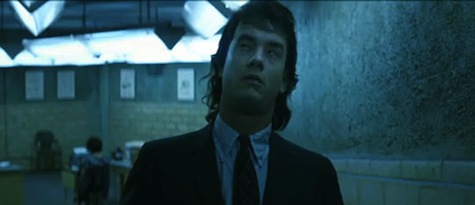
Brain Cloud
Joe Versus the Volcano—John Patrick Shanley
If you’re ever diagnosed with a Brain Cloud, be sure to get a second opinion. But even if the diagnosis is correct, don’t worry about it too much—Brain Clouds have no symptoms, they just kill painlessly about 6 months after you contract them. Which should give you enough time to go have a whimsical adventure, find a soulmate, and procure the perfect luggage set, as evidenced in The Greatest Film of All Time*… Joe Versus the Volcano. Also worth noting, this film was directly parodied by the Teenage Mutant Ninja Turtles in an episode titled “Raphael Versus the Volcano,” cause if there’s one thing kids in the early ’90s loved, it was references to comedies about terminal illness. This film proves that society as a whole would be a lot better if everyone remembered how big everything is occasionally.
*Your mileage may vary.
Leah Schnelbach thinks she might be coming down with something… follow her on Twitter while there’s still time!










